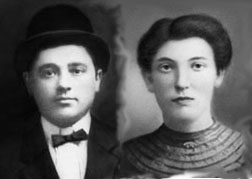SAMUEL GASS AND LENA KESSEL
Raising an American Family with Old World Values

|
SAMUEL GASS AND LENA KESSEL Raising an American Family with Old World Values
|
 |
As the head of the household at 27 County Road, Samuel Gass was a dominant and controlling personality. His force of character was perhaps best demonstrated each and every Shabbos. Samuel was a chain smoker who lit one cigarette from another one. Yet every Friday afternoon just before Lena lit the candles to usher in the Sabbath, he took one last puff and put his cigarettes away until Shabbos ended. Week after week, he went cold turkey from an hour before sunset on Friday until after sunset on Saturday.
Samuel Gass was well informed and quite knowledgeable—he read newspapers daily, including the Jewish paper. He liked to kibbitz about what was new in the world. According to his son’s brother-in-law, Rabbi Baruch Korff:
“Sam Gass was a man of great innate intelligence. Well-known and respected in the Chelsea community, he is remembered as a man who used his resources to bring family members over to America, and to help others in business.”
As Samuel was religious, he brought his children up in a strictly Orthodox home.
According to Max Gass’s wife, Adele:
“My father [Grand Rabbi Jacob Korff] liked and respected Samuel Gass because he was a brilliant, brilliant man. He was self-educated but he was a genius in business. He studied by himself. He observed the Jewish laws to the letter. He made tefillin every weekday, he kept the Sabbath, and to a certain point he made his children observe the Sabbath. My father-in-law was very generous to the outside world and to his sister and brothers, but he always knocked his own children. He was not a good father.”
Louis Gass, a cousin of Sam’s, was devoted to him. His daughter, Thelma Magazine, explained why:
“My father and Shloime[1] were first cousins and there was nothing my father wouldn’t do for him. He would have gotten up in the middle of the night and gone from Lynn to Chelsea to help Shloime. They were extremely close.
“In 1928, my parents were living in New Jersey with my younger sister, Marsha, and me. They had no money and Shloime rescued them. Shloime told my father he would make a place for him in Chelsea. So we moved to Carter Street. At some point, Shloime allowed my father to set up and run a cafeteria in the Lion Shoe Company.
“For a time we lived on County Road, a few houses away from Shloime. At the end of the day, my father would always stop in to say ‘hello’ to Shloime and Lena. When my own son, Joe [Bank], was young, my father would bring him over to Shloime’s. I guess he wanted to show off his family.”
|
|
|
Lena Gass |
Lena Gass was by all accounts, a sensible woman, shy and quiet, a good housekeeper, who devoted her life to her husband and children. According to her daughter-in-law, Adele Gass:
“Lena really overworked herself because the house was so big. She only had help once a week or every other week and she took care of all the rest, the cooking and the cleaning.
“Lena never bucked Sam. Theirs was an arranged marriage but she loved him. The only time I heard Lena speak despairingly about her husband, she began her remark with, ‘The big shot said...
“I’m almost positive Sam loved her. When Lena took sick, nobody thought Sam was sad about it, but he would retreat to his room. When I walked in he tried to cover up his feelings but I could tell he was upset. When she died, he did the same thing. There was some warmth to him but he didn’t know how to show affection to his wife and children. He was terrific with his grandchildren. He could joke with them. He was a much better grandfather than a father.
“Lena was a very unassuming, down-to-earth person. She used to come to my apartment every Friday with a challi and fish, and I used to say to her, Ma, if you wanted to bring the fish up, why didn’t you call me? I’d pick you up. But she never put herself first.
“Shortly after Max and I married, we were invited to a wedding. I owned plenty of clothes and I had a black gown with silver trim on the bottom— very, very pretty but Lena wanted me to buy another gown.
“I said to her, Gee, Ma, this gown is beautiful, I only wore it once.
“She said, Nah, my child, go.
“So I went shopping at Filenes’s French shop and I saw this multi-color chiffon gown. It was beautiful. But when the saleslady told me the price I said, Forget it, and came home. Lena visited that day.
Did you buy? she asked.
I said, No, it’s ridiculous to spend that type of money when I have a perfectly beautiful gown.
So what did you see? she asked.
I described the gown to her. That same week a package came, and I said to the messenger, It’s not for me, I didn’t order anything.
He said, Lady, it’s got your name on the label, it’s paid for, it’s yours.
So I opened up the package and there was the gown. And when I told her she did too much, she said, You know my child that a mother-in-law has to be much better to her daughter-in-law than to her own daughters because the daughters will forgive her for whatever she does, but a daughter-in-law doesn’t."